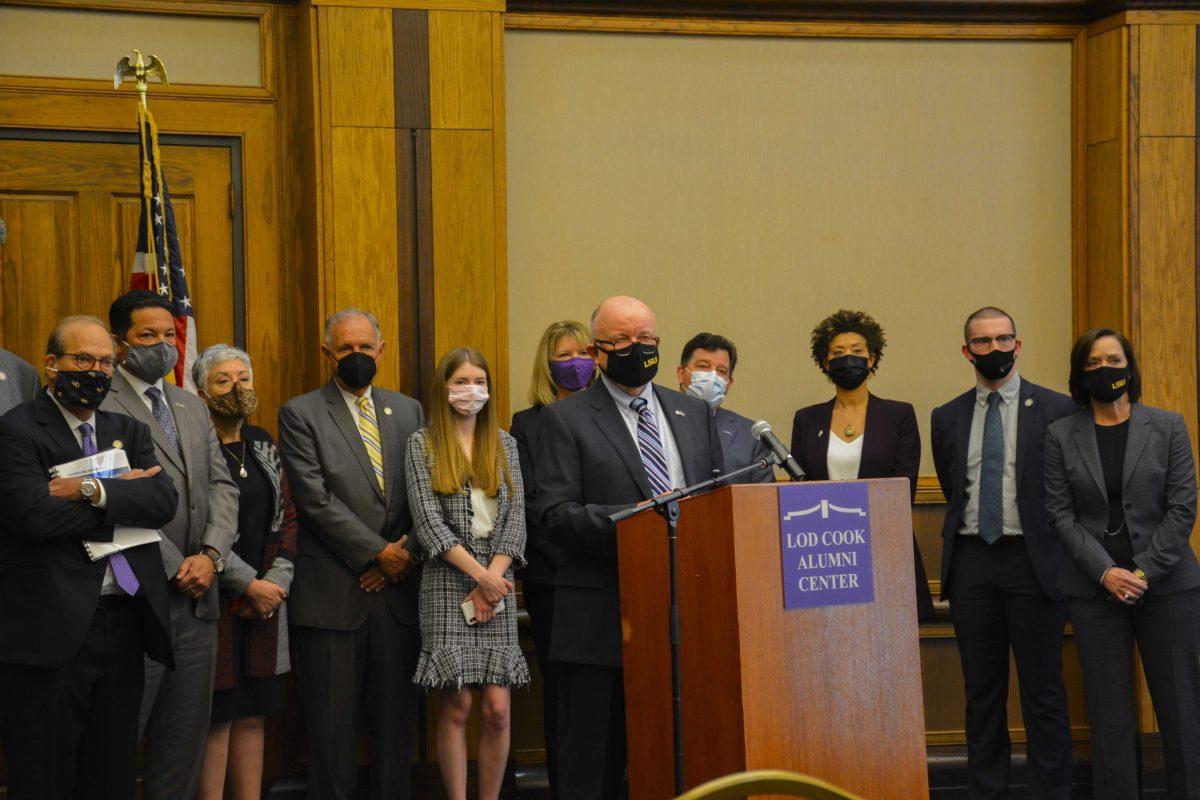Less than a week after the much anticipated Husch Blackwell report on LSU’s inadequate Title IX system was released, the Senate Select Committee on Women and Children held a meeting on March 10 examining how LSU and other Louisiana universities respond to sexual misconduct allegations.
The 10-hour meeting was packed with emotion, but perhaps the most intense moment of the night occurred about seven hours in during an exchange between Sen. Karen Carter Peterson and Interim President Tom Galligan.
While being grilled by Peterson about the inadequacy of the two punishments resulting from the report — a 30-day suspension for Verge Ausberry and a 21-day suspension for Miriam Segar — Galligan stated, “senator, I’m not going to decide based on this afternoon, without thinking, to just fire someone. If I were to do that I would fire myself.”
Peterson’s response: “Well, let’s talk about that.”
The Reveille agrees. Let’s talk about it.
LSU administration’s inability to adequately hold University officials accountable in this systemic failure is especially insulting considering that two other universities have taken more corrective action than LSU has.
Hours after Husch Blackwell’s report was released March 5, University of Kansas placed Les Miles on administrative leave due to disturbing allegations about his behavior toward female students during his tenure at LSU. Miles was fired three days later. Two days after that, KU’s athletic director, Jeff Long, resigned.
On Wednesday, Oregon State University’s Board of Trustees placed former LSU President F. King Alexander on probation until June 1 because of his role in creating a culture of sweeping sexual misconduct complaints under the rug at LSU.
Alexander’s punishment was a slap on the wrist — one harder than any LSU administrator has received thus far.
Rather than dole out sanctions for previous failures, the University has instead elected to invest its energy in establishing a campus culture rooted in transparency and access to much-needed domestic and sexual violence support. This is an admirable goal, but it can, and should, occur in tandem with righting the wrongs from LSU’s past.
Administration is correct in its understanding that public trust will never be secured without transparency, but it will also never be secured without accountability, particularly for those who have made serious, harmful errors.
The two paltry punishments Galligan dished out after securing a months-long, $100,000 investigation not only leaves a sour taste in the LSU community’s mouth, it desperately urges community members to focus on the University’s seemingly bright future rather than the sins of the past.
What message does that send to survivors? Are they expected to roll over and accept the fact that officials who were complicit in their abuse will return to the University relatively unscathed after several weeks’ probation, if they were even disciplined at all?
Peterson’s comment at the March 10 committee hearing packed an especially powerful punch considering that it was addressed to the University’s interim president who has already expressed interest in applying for the permanent position, but it was what we were all thinking.
Students have explicitly called for the termination or resignation of any and all officials, not just Ausberry and Segar, who were found to be involved in the mishandling of sexual assault cases for months. Any members of the University administration, Galligan and Board of Supervisors members included, who feel uncomfortable with that statement should feel free to submit their own resignation letters.
The Reveille closed its Nov. 18 editorial that urged LSU administration to take decisive action regarding the newly surfaced allegations of mishandling sexual assault cases with the reminder that “actions speak louder than words.” Administrators almost immediately began parroting that phrase at every opportunity, so The Reveille has one more turn of phrase it would like the administration to keep in mind:
The punishment must fit the crime.









